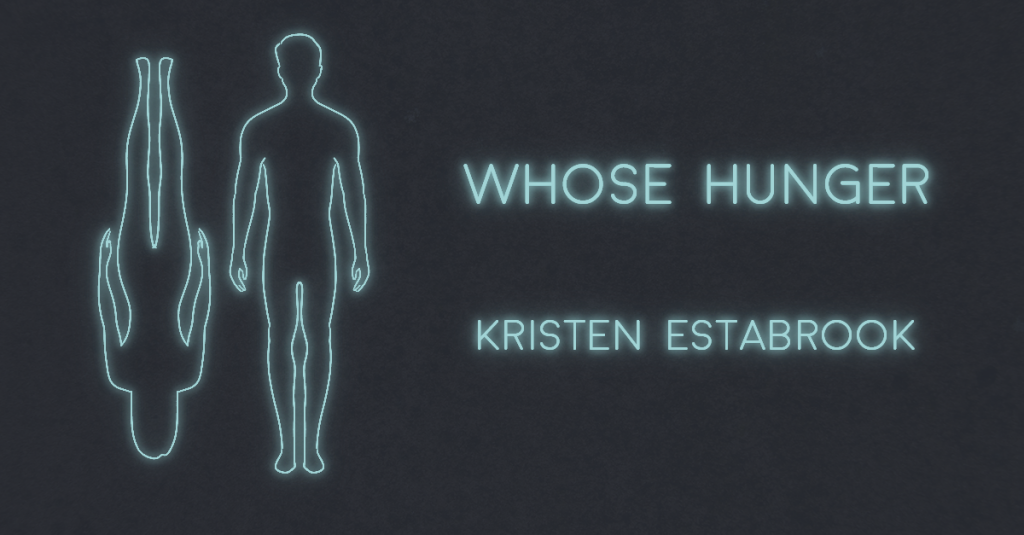
WHOSE HUNGER by Kristen Estabrook
In the hours prior to dinner, she studied her reflection in the mirror, checking and rechecking the flaws in her complexion, adjusting and readjusting the height of her hair, while thinking about sex. On their second date, he had asked about sex. He had asked if she was ready. She was not.
“It’s only the second date,” she had said.
She wondered if he would ask again and expected that he would. She wondered what she would say this time. That it was only the third?
Then she remembered. Her period.
Her period! She was on her period.
That worked out well, she thought.
That would be her reason.
After dinner and the dishes, the woman and the man leaned into each other’s bodies, against the counter at first, then onto his bed. Clothed at first, then unclothed.
“Should I get a condom?” he asked.
“I’m on my period,” she whispered.
“I don’t mind,” he said.
Frantically, she thought. She had no other reason. Her mind dug, searching for something, some other explanation, anything. Nothing came.
“Okay,” she said.
He kissed her harder.
“You might want to take your stuff out,” he said.
Oh, right, yes. She went to the bathroom to take her stuff out. Alone in the bathroom, she thought about changing her mind. She thought about what she might say.
Listen, she could say, This is all moving a bit fast. Maybe we should wait.
But then he would know. He would know that she lied.
If you didn’t want to have sex, why wouldn’t you just say that? he would ask.
She wanted him to think of her as strong and confident. As a woman who asserted her thoughts, her desires, her opinions. She wanted him to think of her as someone other than herself.
Staring at her reflection in the mirror, holding her stuff in her hand, she thought about wanting him. She thought about wanting to want him. She did, didn’t she? Want him? He wanted her. And she didn’t feel that strongly either way. Her neutrality paled in comparison to his desire. What was the point in waiting, anyway?
Besides, she’d already gone through the trouble of taking her stuff out.
After it was done, he reached for his phone. She laid her head on his chest, hoping this touch would give her something sex hadn’t. He held his phone in his hands. She went to the bathroom to put her stuff back inside. When she returned, she found him reading. He had work to do. She knew not to overstay her welcome.
She walked home feeling self-conscious. She passed men waiting for the bus. They watched her. She focused her attention on keeping her eyes forward and her chin tilted slightly upwards, avoiding their gaze. She was sure they knew. She had that look and that smell about her, distinctly belonging to sex.
She called a friend.
She was afraid it had been too soon, that she had rushed, that she had given him the one thing he wanted, and now that he’d gotten it, she’d never hear from him again. The friend was kind.
“He’ll call,” the friend said. “What date was this?”
“The fourth,” she lied.
“Oh, the fourth?” the friend said. “You’re fine.”
She re-imagined the dialogue, feeding lines to her searching mind, hours too late:
“Should I get a condom?” he would ask.
“No thanks, I’d rather not have sex,” she would say.
It was so obvious. So obvious and so simple. So simple and so stupid that this most obvious "no thanks" hadn’t come to mind. It just wasn’t what she had prepared.
She’d read a study years before about humans’ inability to act in a given situation unless they’d previously imagined how they would behave:
There is a chance you will become so overwhelmed by the perilous overflow of ambiguous information that you will do nothing. You will float away and leave a senseless statue in your place. If no one comes to your aid, you will die.1
The author cited a scientist, John Leach, who said that 75 percent of people cannot reason during catastrophic events or impending doom. Survival, he says, depends on preparation. The ones who survive are the ones who have prepared for the worst and have practiced ahead of time.
She had done this. She had planned exactly what she would say. But she had only prepared one means of escape, that was the trouble. That was her downfall. Now she was one of them: a senseless statue, floated away, one of the seventy-five percent. She couldn’t decide if it was comforting or discomforting to be among the majority.
She remembered the days, long since passed, when she made decisions about her body with only her body in mind. Feeling hungry, she fed her body. Feeling thirsty, she hydrated her body. Feeling tight, she stretched her body. This body relied on her. If she did not care for it, who would?
With him, she made a decision about her body with his body in mind. His hunger, his thirst her primary motivation. She cared for his body over her own. Who cared for hers?
1 David McRaney, You Are Not So Smart: Why Your Memory Is Mostly Fiction, Why You Have Too Many Friends on Facebook and 46 Other Ways You’re Deluding Yourself (Oneworld Publications, 2019).